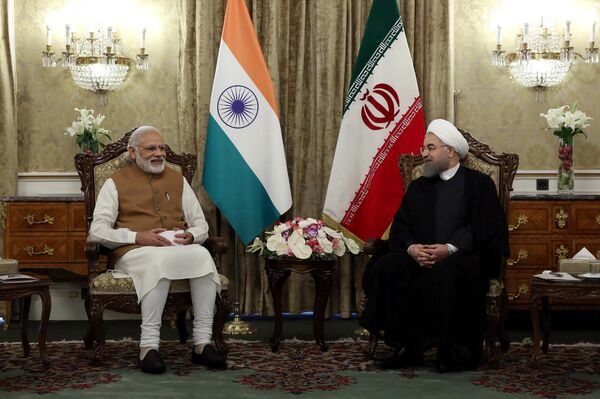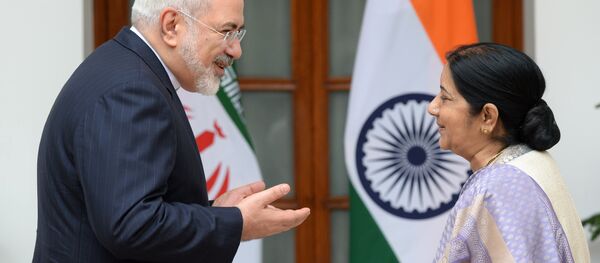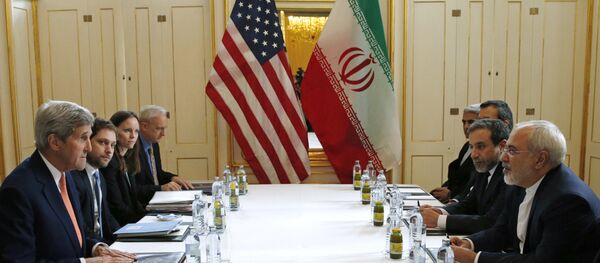Iranian Railways has decided to proceed without India's assistance to connect the port of Chabahar to the Afghan border as part of The Chabahar-Zahedan Railway Line project, which is expected to improve New Delhi’s trade ties with Central Asian countries. Iranian Railway reportedly aimed to complete the project by March 2022 while using approximately $400 million from the Iranian National Development Fund, Indian news daily The Hindu quoted unnamed officials as saying.
The 628km railway project is part of India’s commitment to the trilateral agreement between India, Iran and Afghanistan and aimed at boosting regional maritime transit traffic to Central Asia, bypassing Pakistan. The direct trade route between India and Afghanistan is via Pakistan, which is deemed unreliable due to strained bilateral relations between New Delhi and Islamabad over the Kashmir issue. Pakistan and Afghanistan share 18 crossing points and currently only four are open, including the Wagah border, which reopened on Monday.
Former Indian ambassador R Dayakar terms India “losing the iconic” Chabahar-Zahedan railway track as unfortunate on the part of Ircon International Limited which promised the project a $1.6 billion fund in 2016. Explaining the significance of the route, he says the project connects to the Afghanistan border, which would have facilitated bilateral trade while circumventing Afghanistan’s dependence on the Karachi to Peshawar line.

The former Indian ambassador believes that the $1.6 billion project will go ahead and that it is being delayed due to international banking sanctions on Iran.
“I think diplomatic efforts will be put in place to secure the railway project deal with Iran,” he says.
A report by Indian news daily The Hindu quotes unnamed officials as saying: “The US had provided a sanctions waiver for the Chabahar port and the rail line to Zahedan, but it has been difficult to find equipment, suppliers and partners due to worries they could be targeted by the US.”
Iran's Pressure Tactics
Geostrategic expert Kabir Taneja sees Iran’s actions as “tactics to put pressure on New Delhi to expedite these projects”. Recounting the 2019 incident, when Tehran issued a similar statement on the Farzad B gas project in Iranian media. Taneja believes this development will unfold along the same lines.
“When Iran says that India has been dropped and we are going to do it on our own, it makes a very good headline, it’s a good pressure tactic, it’s a good way to bring it to the public domain,” Taneja says.
In August 2019, Iranian Oil Minister Bijan Namdar Zanganeh said: “Our intention is to hold final talks with them [India]….if they are not ready to do the project, we will continue with an Iranian company…..”
Three Indian companies had opened Farzad-B, with estimated reserves of 12.8 trillion cubic feet of gas, in 2008 to develop the field after its exploration, but was stopped after intensified sanctions from the West.
India had called for the development of Farzad-B after the lifting of the sanctions.
Defending the delay in funds as having happened “because of pressure of American sanctions”, Taneja says: “India cannot go too much against US sanctions because New Delhi is as responsible country with part of a multiple financial task force and international financial transparency organisations. Going against sanctions can violate international law as well, and more than that India doesn’t want to push the buttons of the United State for no reason.”
If not India, then China
While there is no official confirmation to the claim that India is being dropped from the rail project, the development has come a day after China finalised a massive 25-year $400 billion strategic partnership deal with Iran, focused on investments in infrastructure, manufacturing and upgrading energy and transport facilities, and also refurbishing ports, refineries and other installations.
“Whenever Iran has to push India to make honour its commitment, it often says that if you will not do it, we will get someone else to do it,” Taneja says while emphasising that it is often a nudge towards China. “If you will not do it, China will come and do it, and you will lose out on these opportunities,” he said regarding Iran’s decision to go ahead with the development alone.
However, Washington has made it clear that it could act unilaterally to invoke the “snapback” clause of UN Security Council Resolution 2231 to restore all prior UN sanctions as part of the JCPOA. While Russia and China have rejected the UN Security Council resolution, India, being a non-permanent member, may also has some influence over the terms of any revised restrictions.







